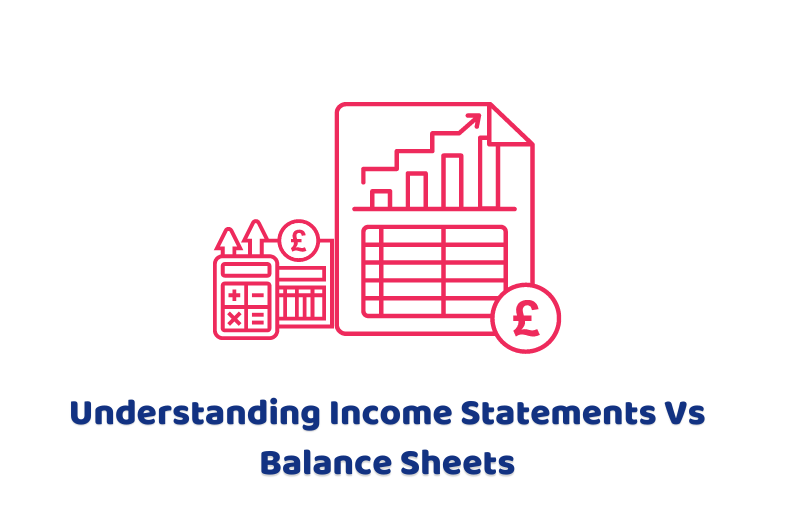Income statement vs balance sheet confuses many as they are the most important tools to evaluate the performance of a business simultaneously. Along with other financial statements, income statements and balance sheet helps creditors, investors and financial analysts in making crucial decision.
On the other hand, it provides useful information on the company’s current financial position along with insights over the past years. As a result, they can predict some changes taking place in their finances.
In this blog, we will shed light on the income statements and balance sheets separately. Later, we will describe their differences and similarities. Before we move on, let us introduce the five key financial statements used in analysing the financial performance of a business.
- Income Statement.
- Balance Sheet.
- Statement of Cash Flow.
- Statement of Changes In Equity.
- Statement of Financial Position.
We will focus only on the first two statements here. So, let’s dive in!
Qualified accountants at the AccountingFirms will sort out all the issues on your income statements and balance sheets accurately and smartly.
What is Income Statement and Why is it Important?
An income statement, also known as the statement of profit and loss, provides useful information about the income generated and expenses during one accounting period. It is periodically issued to help analyse the performance of a business. Typically, companies issue this key report on a quarterly basis, half-year and end-year reports.
The income statement is an important financial report as it informs the company and investors about the net income. There’s a possibility a company might be unprofitable for a few quarters. However, the companies make their statement of profit and loss more attractive with more revenues.
This statement tells a lot about the financial position of an organisation and where it stands right now among its competitors and peers in the same industry. While investing, shareholders compare the income statements to evaluate the financial position and the capacity to generate profits during a specific period.
The income statement categorises the revenues and expenses into various categories. For example, you will see the following on it:
- Revenue
- Cost of goods sold (COGS)
- Sales, General, and Administrative expenses
- Other operating expenses
- Non-operating income and Non-operating expenses
- Gains and Losses
- Non-recurring items
- Net income
- Earnings Per Share (EPS)
What is a Balance Sheet and Why is It Important?
A balance sheet informs about the total assets, total liabilities and shareholder’s equity. The total assets and liabilities cover both short-term and long-term assets and liabilities. Moreover, they provide useful information about the shareholder’s equity.
One important principle of accounting here is that the total assets must be equal to the total liabilities. What’s leftover is the equity of the shareholders or the investors. As a result, it reflects how liquid or riskier a company is. Furthermore, it helps the company analysts to calculate different profitability ratios as well.
A balance sheet also helps the internal management take key decisions like the mode to raise capital either by debt or equity.
Following are the important components of a balance sheet:
- Current Assets
- Investments
- Non-Current Assets
- Intangible Assets including goodwill
- Current Liabilities
- Non-Current Liabilities
- Shareholder’s Equities including Common Stocks and Retained Earnings
Balance Sheet Vs Income Statement
If we discuss the income statement and balance sheet separately, we cannot reach an informed decision. This is the reason they are studied and evaluated side by side to get an in-depth analysis of the financial health and performance of the businesses.
Structure: The income statement reflects the performance of a company over a particular period. On the contrary, the structure of a balance sheet provides details about what the company owns and owes at a particular point in time.
Financial Health vs. Financial Performance: An income statement clearly provides details about the financial performance of a company, while a balance sheet gives insights into the financial health of a company.
Profitability vs. Financing: Profitability can only be analysed with the help of an income statement. On the contrary, a balance sheet provides details about the financing of the liabilities and how to raise capital.
Categorisation: Income statements take into account payment or receipt when it actually has been realised. On the other hand, a balance sheet considers them as an asset that is yet to receive.
Use of Statements: An income statement is used by industry analysts and shareholders to determine the profitability of a company. On the other hand, a balance sheet provides information to creditors about the resilience of a company by giving details about the assets and liabilities.
The Bottom Line
Finally, we conclude about the significance and differences between the income statements and balance sheets. An income statement provides detailed information about the profitability of an organisation. On the contrary, a balance sheet provides information about how strong and solid a business is.
Balance sheet vs income statement provides insightful information to the business owners, creditors and investors about the financial position of a business. One important point to mention here is that these financial reports are prepared according to the Generally Accepted Accounting Principles (GAAP) and with the help of independent auditors.
We aspire to make your financial statements free of errors and up-to-date with the help of experienced accountants and bookkeepers at the AccountingFirms.
Disclaimer: All the information provided in this article on income statement vs balance sheet, including all the texts and graphics, is general in nature, It does not intend to disregard any of the professional advice.

